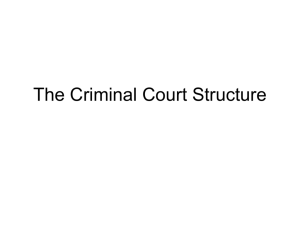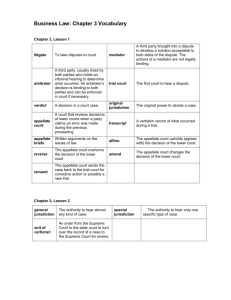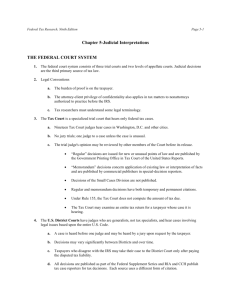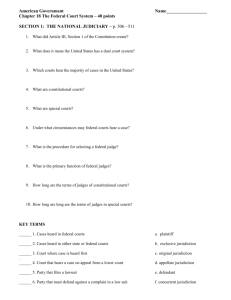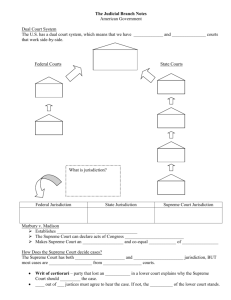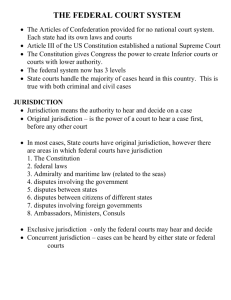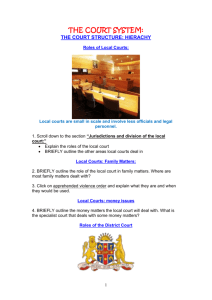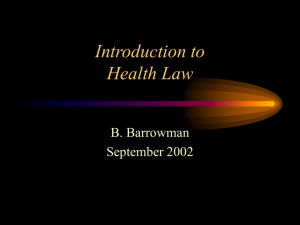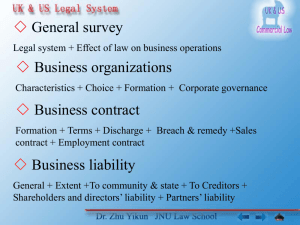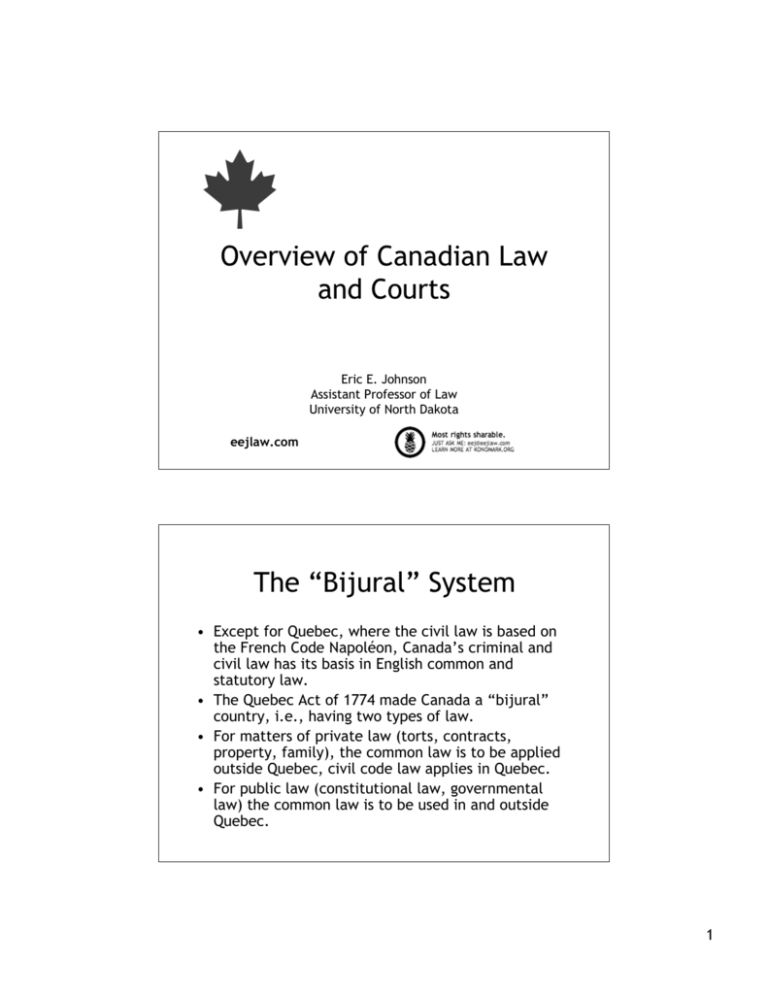
Overview of Canadian Law
and Courts
Eric E. Johnson
Assistant Professor of Law
University of North Dakota
eejlaw.com
The “Bijural” System
• Except for Quebec, where the civil law is based on
the French Code Napoléon, Canada’s criminal and
civil law has its basis in English common and
statutory law.
• The Quebec Act of 1774 made Canada a “bijural”
country, i.e., having two types of law.
• For matters of private law (torts, contracts,
property, family), the common law is to be applied
outside Quebec, civil code law applies in Quebec.
• For public law (constitutional law, governmental
law) the common law is to be used in and outside
Quebec.
1
Trial by Jury
• Under the Canadian Charter of
Rights and Freedoms, individuals
accused of the most serious
criminal offences generally have
the right to choose to be tried by a
jury or by a judge alone.
• Sentencing is left to the judge.
• Trial by jury is also available in
some civil litigation, but is rarely
used.
Federal and Provincial Courts
• By virtue of the Constitution Act, 1867,
authority for the judicial system in Canada is
divided between the federal government and
the ten provincial governments.
• Provincial/territorial courts
– General jurisdiction
– Except where excluded by statute
• Federal courts
– Certain cases having federal jurisdiction, as
specified in statute
2
Provincial Courts
• Provincial governments are given jurisdiction over
"the administration of justice" in the provinces,
which includes "the constitution, organization and
maintenance" of the courts, both civil and criminal,
in the province, as well as civil procedure in those
courts.
• The power to appoint the judges of the superior
courts in the provinces - trial and appellate - is
given to the federal government
• Federal government also remunirates judges and
can remove them.
– This removal power has never been exercised.
Federal Courts
• Cases having federal jurisdiction:
–
–
–
–
–
–
province vs. province
federal government vs. province
intellectual property cases (e.g., copyright)
citizenship appeals
Competition Act cases
cases involving Crown corporations or departments of the
Government of Canada
– review of decisions and actions by federal boards,
commissions and tribunals
3
Canadian Court System
Supreme Court of Canada
• Final court of appeal
• Appellate jurisdiction over
all other Canadian courts
4
Supreme Court of Canada
• Consists of one chief justice and eight puisne justices, all
appointed by the Governor-in-Council.
• Judges serve for terms of "good behaviour”
• Mandatory retirement at age 75
• The Supreme Court Act requires that at least three judges
must come from Quebec.
• Traditionally, of the other six judges, three come from
Ontario, two from western Canada, and one from the Atlantic
provinces.
Supreme Court of
Canada
• The SCC must grant leave to an appeal before it
will hearing the case.
• Leave applications are usually made in writing
and reviewed by three members of the Court,
who then grant or deny the request without
providing reasons for the decision.
• A grant of leave is discretionary and not given
routinely.
• Exception: No leave required in criminal cases
where a judge on the appellate panel dissented
on a point of law.
5
Supreme Court of
Canada
An advisory role …
• The government may ask the Court to consider
questions on any important matter of law or fact,
especially concerning interpretation of the
Constitution.
• The SCC may also be asked questions on the
interpretation of federal or provincial/territorial
legislation or the powers of Parliament or the
legislatures.
• (Provincial and territorial courts of appeal may also
be asked to hear references from their respective
governments.)
Canadian Tort Law
Three Things to Know
courtesy of Professor Jennifer L. Schulz
University of Manitoba, Faculty of Law
1. Normally, civil cases do not have jury trials
(it’s usually judge alone).
2. The SCC has effectively capped personal injury
damage awards, such that the multi-million
dollar amounts awarded by some American
courts/juries are simply impossible in Canada.
3. There are cost consequences for launching an
unsuccessful lawsuit. This discourages
frivolous litigation because if a plaintiff sues
and loses, the plaintiff will be required to pay
some portion of the defendant's legal fees.
6
Sources
• Department of Justice Canada material on web:
http://www.justice.gc.ca/eng/jl/index.html
• Supreme Court of Canada website: http://www.scc-csc.gc.ca/courtcour/sys/index-eng.asp
• Text from the above sources was taken, in many cases, verbatim
without specific notation.
Copyright 2008 Eric E. Johnson. All rights reserved.
Konomark. Most rights sharable. ejohnson@law.und.edu
7


